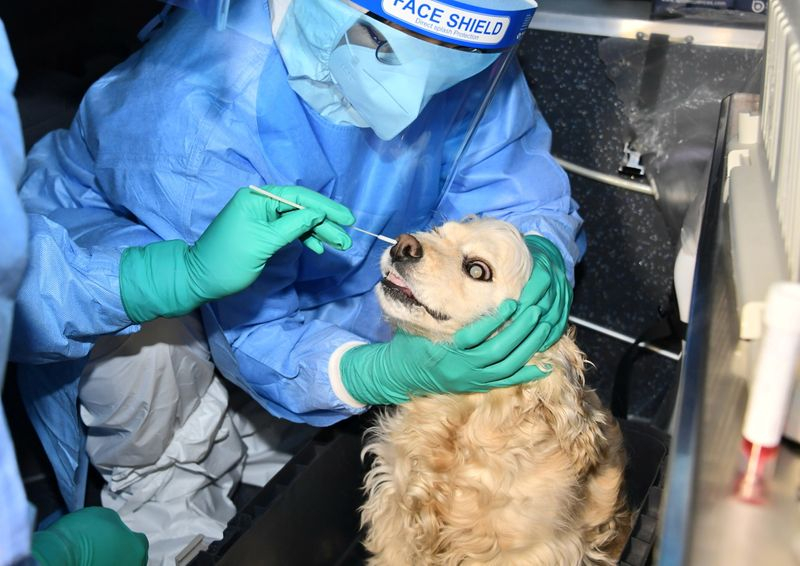UK variant can cause serious heart problem in pets; Sinovac vaccine appears safe in children By Reuters

By Nancy Lapid
(Reuters) – The following is a roundup of some of the latest scientific studies on the novel coronavirus and efforts to find treatments and vaccines for COVID-19, the illness caused by the virus.
UK variant can make pets very sick
The coronavirus variant first identified in the UK, known as B.1.1.7, has been linked to severe cases of heart disease in pets who appear to have caught the infections from their humans, veterinarians near London report. The original strain of the virus did not appear to cause serious illness in pets. But between mid-December and February, mirroring the emergence and spread of B.1.1.7, the vets noticed a sudden surge of cats and dogs with myocarditis, a serious inflammation of the heart. In a paper posted on Thursday on bioRxiv ahead of peer review, they describe 11 animals who suddenly became critically ill. Two cats and one dog immediately tested positive for B.1.1.7; another two cats and one dog later tested positive for antibodies. Many owners of these affected pets had a recent history of confirmed COVID-19. Myocarditis in pets remains rare, and in all of these cases it appears that the infections were passed from people to pets, and not vice versa, said coauthor Dr. Luca Ferasin of The Ralph Veterinary Centre in Marlow, Buckinghamshire. “Our cats and dogs made a remarkable clinical improvement after a few days in intensive care,” he said. People concerned about their pets’ health should contact their veterinarian, he added. (https://
COVID-19 vaccine from China appears safe in children
Sinovac Biotech’s COVID-19 vaccine appears to be safe and able to trigger immune responses among children and adolescents ages 3 to 17, the company said on Monday. The data from early and mid-stage trials involving 500 participants compared medium and low dosages of vaccine to a placebo. Most adverse reactions were mild, Zeng Gang, a researcher with the company, told an academic conference in Beijing. The antibody levels triggered by Sinovac’s CoronaVac were higher than those seen in adults in earlier clinical trials of the shot, Zeng said. CoronaVac’s effectiveness in adults has been lower compared to data from trials of other available vaccines. The company is also testing a third booster shot for adults in a China-based clinical trial, with participants given a third dose around eight months after receiving the second. The preliminary data in children have not yet been formally released. (https://reut.rs/3lGZeHS)
Lockdowns linked with “substantial” weight gain
Substantial weight gain is a clinically relevant effect of the coronavirus lockdowns, a new study suggests. Researchers from the Health eHeart Study tracked 269 adults from 37 U.S. states and the District of Columbia who volunteered to report weight measurements from their Bluetooth-connected smart scales. Roughly half were men, 77% were white, and the average age was 52. After shelter-in-place regulations took effect, participants “steadily” gained weight, regardless of their health status or where they lived, according to a report published on Monday in JAMA Network Open. On average, they gained 0.27 kg (9.52 oz) every 10 days, or about 0.7 kg (1.54 pounds) per month. The investigators acknowledged that people who own Bluetooth-connected scales may not be representative of the general population. “It is important to recognize the unintended health consequences sheltering-in-place can have on a population level,” they said. “The … data demonstrate a need to identify concurrent strategies to mitigate weight gain, such as encouraging healthy diets and exploring ways to enhance physical activity, as local governments consider new constraints in response to SARS-CoV-2 and potential future pandemics.” (https://
Stroke rate under 1% among U.S. COVID-19 patients
During the first nine months of the coronavirus pandemic in the United States, fewer than 1% of hospitalized patients with COVID-19 suffered strokes related to blood clots in brain arteries, new research shows. Among 21,073 patients hospitalized from March through November, 160 experienced ischemic strokes, for an overall risk of about 0.75%, according to research presented by Dr. Saate Shakil of the University of Washington in Seattle on Friday at the American Stroke Association International Stroke Conference. The data, collected by the American Heart Association, showed that those who suffered strokes were older, more often male, and more likely to have medical conditions known to raise the risk for stroke. Racial disparities were also evident, with non-Hispanic Black patients at higher risk than Hispanic and non-Hispanic white patients. Early in the pandemic, the rate of ischemic stroke in COVID-19 patients had been higher, with reported rates ranging from 0.9% to 2.0%, Shakil noted, and many younger COVID-19 patients were affected. As a result, the World Health Organization, the U.S. National Institutes of Health, and other top health organizations issued guidelines calling for routine use of blood thinners to prevent clots and strokes in adults hospitalized for COVID-19. (https://
Open https://tmsnrt.rs/3c7R3Bl in an external browser for a Reuters graphic on vaccines in development.

